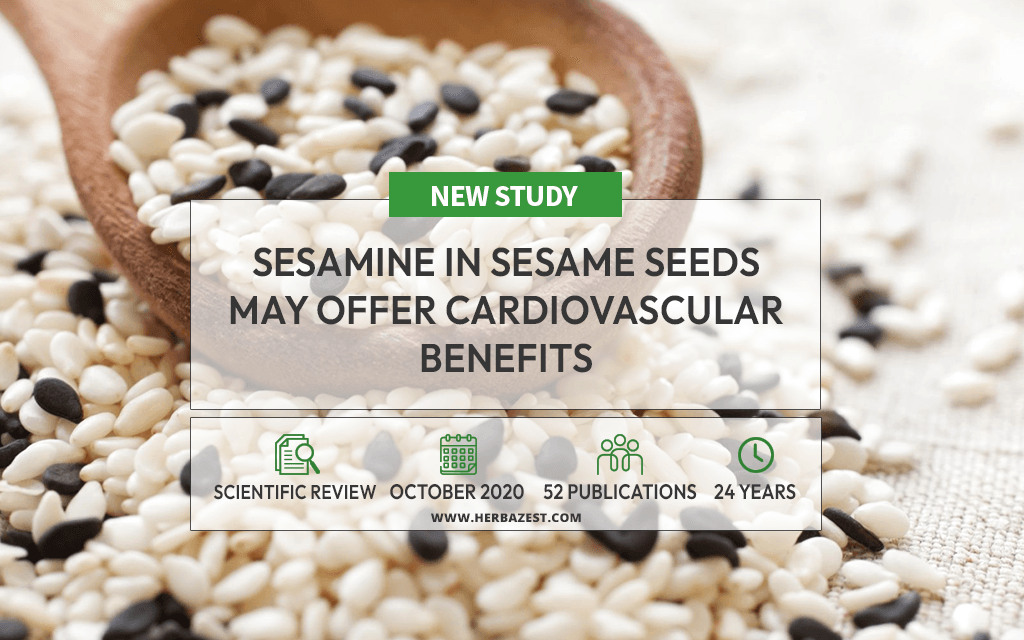In the pursuit of improved cardiovascular health, researchers continually explore natural compounds with potential therapeutic properties. Sesamin, a prominent lignan found abundantly in the seeds of sesame plant, has emerged as a subject of interest due to its antioxidant and anti-inflammatory characteristics. These attributes are particularly relevant given the pivotal role oxidative stress and inflammation play in the development and progression of cardiovascular diseases (CVDs).1
The Study
This comprehensive review was conducted by researchers at the American University of Sharjah in the United Arab Emirates. They thoroughly reviewed 52 publications of in vitro and in vivo studies conducted between the years 1995 and 2019 on sesamin's cardiovascular benefits. The results were published in the peer-reviewed Saudi Pharmaceutical Journal.
The Results
The authors of the review found solid scientific evidence suggesting the following beneficial effects of sesamin on cardiovascular risks:
- Hypertension: Sesamin demonstrates potent anti-hypertensive effects by inhibiting oxidative stress and bolstering nitric oxide activity. This suggests its potential as a therapeutic option for managing hypertension and mitigating CVD risk.
- Atherosclerosis: Through mechanisms like the inhibition of inflammatory cytokines and reduction of lesion formation, sesamin exhibits anti-atherogenic properties. It shows promise in impeding the progression of atherosclerosis, a hallmark of CVD.
- Thrombosis: Sesamin's antioxidant properties contribute to its anti-thrombotic effects, making it a potential agent in reducing clot formation and associated risks.
- Diabetes: Studies indicate sesamin's ability to improve glucose metabolism and insulin sensitivity, offering avenues for managing diabetes and its cardiovascular complications.
- Obesity: Sesamin shows potential in combating obesity by modulating lipid metabolism and adipocyte function, thus presenting a multifaceted approach to addressing obesity-related CVD risks.
- Inflammation: Sesamin's anti-inflammatory effects, mediated through various signaling pathways, contribute to its therapeutic potential in managing conditions like hypertension, atherosclerosis, and diabetes.
What Does this Mean?
The findings underscore sesamin's multifaceted role in cardiovascular health. By targeting oxidative stress and inflammation, sesamin addresses key pathways implicated in CVD development and progression. Its ability to modulate various risk factors, from hypertension to obesity, highlights its versatility as a potential adjunctive therapy in CVD management.
Extracted from sesame seeds, sesamin holds promise to augment traditional therapeutic approaches, offering a safer alternative with fewer side effects. While the evidence supporting sesamin's cardiovascular benefits is compelling, further research, particularly in human trials, is warranted to validate its efficacy. Understanding the optimal dosages and delivery mechanisms of sesamin supplements is crucial for translating these findings into clinical practice.
Other herbs that have been found to promote heart health are garlic, hawthorn, turmeric, and green tea.
Sources
- Saudi Pharmaceutical Journal, Health benefits of sesamin on cardiovascular disease and its associated risk factors, 2020
Footnotes:
- Oxidative Medicine and Cellular Longevity. (2020). Unveiling the Role of Inflammation and Oxidative Stress on Age-related Cardiovascular Diseases. Retrieved June 7, 2024, from https://www.ncbi.nlm.nih.gov/pmc/articles/PMC7232723/




